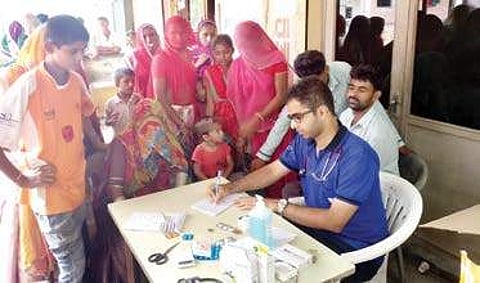

MANGALURU: AFter completing MD (Doctor of Medicine in Community Medicine), everyone expected Edmond Fernandes to follow the traditional route of practising medicine in a hospital or private clinic. But he surprised his peers and teachers by walking the less trodden path: examining the ills that plague our public health system and finding an antidote for it.
Those close to Dr Fernandes knew that the young doctor’s heart was set on redressing the larger issue of health. Barely 26, the doctor has already participated in three relief missions, including the recent Gujarat floods, as part of his mission.
“ My first relief mission was in Philippines, which was destroyed by Haiyan Typhoon in 2013,’’ recalls Dr Fernandes. The typhoon had claimed 6,300 lives. He was next involved in providing help to residents of Chennai, who were ravaged by the worst - ever floods in 2015. It was possible for the health consultant to get involved and render help post disasters as the Centre for Health and Development (CHD), which he heads, has strategic partnership with different institutions working in areas of disaster management.
A strategic partnership with New Delhi - based SEEDS had helped Dr Fernandes lead a medical team to Gujarat. “SEEDS oversaw rehabilitation services in schools , with logistical help from corporates,’’ he says. In all 362 patients attended their health camps conducted in rural pockets of Banaskantha district between Aug ust 11 and 15.
“ Banaskantha, the worst - hit district, had witnessed 61 deaths. Nearly 80,000 people were displaced by floods. Even after a fortnight , the flood waters ha ve not receded at many places. “ He warned that if a cleanliness drive is not initiated at the earliest, there will soon be water -borne and vector - borne diseases.
The abject poverty in the villages, says Dr Fernandes, has been a revelation. It’s a slow road to development. “They are at least half-a-century behind. Women are still backward. A woman attending a health camp complained of acute eye pain but refused to lift the veil and allow me to examine her eye,’’ he said. As India enters its 71st year of Independence, the doctor says he found revolutionary schemes like RTE and other s to be the privilege s of a few.
Dr Fernandes wears many hats on his young head. He is founder and Chief Executive Officer of CHD and member of Task Force, District Disaster Management Authority (DDMA). He is also involved in conducting seminars, capacity building training in areas of disaster management and global health. His CHD was behind the move to make seat belts compulsory in Mangaluru.
But does he miss conventional medical practice ? No, says Dr Fernandes, explaining that practising medicine with limited resources is a bigger challenge.
Dr Fernandes has also authored two books and writes frequently on public health issues. He hopes that CHD will become an institution, changing lives and creating more jobs. He also hopes more corporates help in the rehabilitation efforts in disaster-struck areas. And what’s his motto in life? The good doctor sums it up with a paraphrased line from George Eliot’s poem , which he says is his guiding principle in life. “What do we live for, if not to help others.”